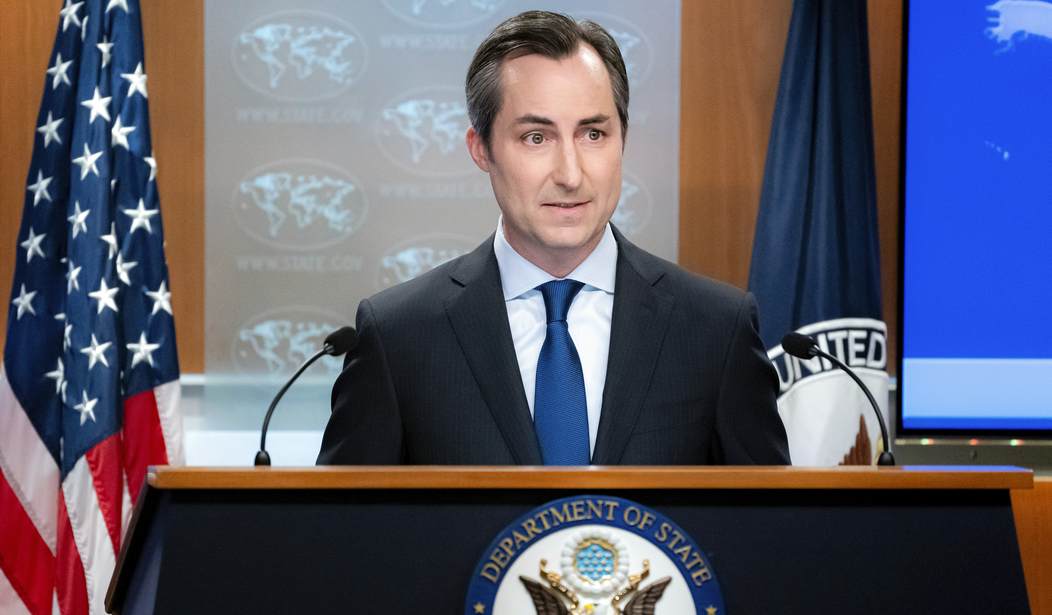After Hamas terrorists agreed to a "softened" version of a ceasefire deal that is an unserious, deceptive ploy aimed at delaying Israel's looming offensive in Rafah, the State Department refused to directly comment on the terms (pending a U.S. review) to which Hamas had agreed — but again insisted that the Biden administration's "top priority" is to reach a "ceasefire agreement that will lead to the release of hostages" and allow a "surge of humanitarian assistance" into Gaza.
Note the subtle but significant rhetorical difference between a ceasefire that releases hostages and a ceasefire deal that will lead to the release of hostages. They're not the same, and the Biden administration knows that.
State Department Spokesperson Matthew Miller said Monday that the Biden administration previously "made clear" to Hamas that it should "accept the offer" repeatedly made by Israel in recent weeks — the ceasefire offers so far rejected by Hamas while its U.S. based supporters in the halls of Congress and encampments on university grounds continue chanting "CEASEFIRE NOW."
Seeming to put on his Hamas apologist hat, the State Department's Miller then complained that the Biden administration has "not seen" a "humanitarian plan that is credible" or "implementable" for Israel to launch a military offensive to root out Hamas terrorists in their final stronghold of Rafah near the border with Egypt in Southern Gaza.
According to the State Department, "a military operation in Rafah right now would dramatically increase the suffering of the Palestinian people" and "would lead to an increase in loss of civilian life." Never mind, apparently, the reality that Israel's prosecution of the war started by Hamas on October 7 has seen IDF operations protect civilian lives on a level unseen in recent conflicts — including those in which the U.S. military is a belligerent.
Miller also lamented the idea that an IDF operation in Rafah "would dramatically disrupt the delivery of humanitarian assistance, all of which is coming through- I shouldn't say all, the great majority of which is coming through Kerem Shalom."
If Kerem Shalom sounds familiar, it should — it's the border crossing between Israel and Gaza near Rafah, the one Hamas terrorists attacked with rockets on Sunday, killing three IDF soldiers and wounding even more. It would be "very difficult, if not impossible," for aid to be distributed in Rafah while an IDF operation plays out, Miller said.
Would it be as difficult as it is to deliver aid when Hamas is blowing up the primary entry point for humanitarian aid into Gaza, one might ask the State Department and Biden administration.
If, as Miller insists, the Biden administration wants to "reduce the suffering" of the "Palestinian people," then it should be urging and supporting Israel in its plans to clear Hamas out of Rafah and any other location they remain in Gaza. It is Hamas who brought on any and all suffering since 2007 when Israel forcibly removed its citizens from Gaza and handed the keys to the people who subsequently elected Hamas as their government. Hamas is the reason there is a war in Gaza after its Iran-backed terrorists violated a ceasefire that existed on October 6. If aid isn't getting to residents of the enclave, that too is solely the fault of Hamas as it steals humanitarian supplies, shoots civilians trying to access the aid, and tries to destroy the port of entry for such aid.
For the State Department and the Biden administration to pretend any other reality exists is pathetic partisan pandering in feeble hope of retaining support from a small group of voters in Michigan that Biden thinks he needs to be re-elected in November. As Monday's State Department briefing showed again, Rashida Tlaib is effectively setting U.S. foreign policy. In practice, that means the Biden administration is doing what it can to allow Hamas' survival after its terrorists murdered more Jews in any single day since the Holocaust. If the administration did not want Hamas to survive, the president would not be withholding congressionally allocated military aid to Israel or telling Israel not to pursue action against the final Hamas stronghold of Rafah.

